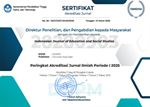Akyıl, Y., Oral, T., & Erdinç, B. (2024). Parallel Mediating Role of FoMO and Mental Well-Being Between Entrapment and Psychological Distress. İnsan ve Toplum Bilimleri Araştırmaları Dergisi, 13(5), 2319–2336. https://doi.org/10.15869/itobiad.1544859
Anbiya, N. N., & Sofyan, A. (2021). Hubungan Antara Promosi Penjualan Dengan Minat Beli Konsumen. Jurnal Riset Manajemen Komunikasi, 1(2), 130–137. https://doi.org/10.29313/jrmk.v1i2.555
Ariasih, M. P., & Putra, I. P. (2022). Analisis Pengaruh Marketing Influencer TikTok Terhadap Keinginan Pembelian Pada Pengguna Aplikasi TikTok. Jurnal Sutasoma, 1(1), 22–27. https://doi.org/10.58878/sutasoma.v1i1.178
Auvarda, C. (2022). Efektivitas Iklan Pada Televisi Vs Iklan Penargetan Ulang Sebagai Media Pengingat di Masyarakat. Jurnal Studi Komunikasi, 6(1), 291–314. https://doi.org/10.25139/jsk.v6i1.3509
Bara, A., Affandi, F., Farid, A. S., & Marzuki, D. I. (2021). The Effectiveness of Advertising Marketing in Print Media During the Covid-19 Pandemic in the Mandailing Natal Region. Budapest International Research and Critics Institute-Journal (BIRCI-Journal), 4(1), 879–886. https://doi.org/10.33258/birci.v4i1.1688
Campbell, C. (2020). I Shop Therefore I Know That I Am: The Metaphysical Basis of Modern Consumerism. In Elusive Consumption (pp. 27–44). Routledge. https://doi.org/10.4324/9781003085232-4
Chih, W.-H., Hsu, L.-C., & Liou, D.-K. (2017). Understanding Virtual Community Members' Relationships from Individual, Group, And Social Influence Perspectives. Industrial Management & Data Systems, 117(6), 990–1010. https://doi.org/10.1108/IMDS-03-2016-0119
Ghahramani, A., De, M., & Prokofieva, M. (2022). The Potential of Social Media in Health Promotion Beyond Creating Awareness: An Integrative Review. BMC Public Health, 22(1), 2402. https://doi.org/10.1186/s12889-022-14885-0
Hall, S. (2024). Culture, The Media and the 'Ideological Effect.' In New Critical Writings in Political Sociology (pp. 341–374). Routledge. https://doi.org/10.4324/9781003572923-19
Hall, S., & Liebenberg, L. (2024). Qualitative description as an introductory method to qualitative research for master’s-level students and research trainees. International Journal of Qualitative Methods, 23, 16094069241242264. https://doi.org/10.1177/16094069241242264
Hidayat, A. S., Aklis, M. Z., & Asyifin, A. N. (2024). Konsumerisme Pada Santri Di Era Digital. ASNA: Jurnal Kependidikan Islam Dan Keagamaan, 6(2), 1–8.
Kerr, G., & Richards, J. (2021). Redefining advertising in research and practice. International Journal of Advertising, 40(2), 175-198. https://doi.org/10.1080/02650487.2020.1769407
Khadijah, K., Oktasari, M., Stevani, H., & Ramli, M. (2023). Fear of Missing Out (FoMO) Dalam Perspektif Teori Solution Focused Brief Counseling. Research and Development Journal of Education, 9(1), 336–343. https://doi.org/10.30998/rdje.v9i1.14841
Kumar, K. (2020). From Post-Industrial to Post-Modern Society. In The Information Society Reader (pp. 103–120). Routledge. https://doi.org/10.4324/9780203622278-13
Manzotti, R. (2023). I Shop Therefore I Am: The Artificial Consumer. Journal of Artificial Intelligence and Consciousness, 10(1), 49–70. https://doi.org/10.1142/S2705078522500151
Pujiono, A., Kanafi, K., & Farida, M. (2022). Media Sosial Sebagai Sumber Belajar Bagi Generasi Z. Regula Fidei: Jurnal Pendidikan Agama Kristen, 7(2), 252–262. https://doi.org/10.33541/rfidei.v7i2.80
Purwanto, A. (2024). Pengaruh Penggunaan Media Sosial TikTok Terhadap Perilaku Fear of Missing Out (FoMO) Di Kalangan Siswa SMA Negeri 1 Wajo. Precise Journal of Economic, 3(1), 105–111.
Rafiq, A. (2020). Dampak Media Sosial Terhadap Perubahan Sosial Suatu Masyarakat. Global Komunika: Jurnal Ilmu Sosial Dan Ilmu Politik, 3(1), 18–29.
Ruslita, G., & Seran, A. (2025). Media dan Konsumerisme: Studi Kritis Pahlawan Konsumtif Dalam Budaya Populer. Journal of Mandalika Literature, 6(1), 480–492.
Saharani, L., & Diana, S. (2024). Optimization of Islamic Values-Based Public Relations Strategy in Increasing New Student Admissions. Managere: Indonesian Journal of Educational Management, 6(2), 194–206.
Sale, J. E. (2022). The role of analytic direction in qualitative research. BMC Medical Research Methodology, 22(1), 66. https://doi.org/10.1186/s12874-022-01546-4
Sánchez, S. I., Flavián, M., & Belanche, D. (2022). Influencers and Brands Successful Collaborations: A Mutual Reinforcement to Promote Products and Services on Social Media. Journal of Marketing Communications, 28(5), 469–486. https://doi.org/10.1080/13527266.2021.1929410
Sebastian, A., & Yuwono, A. T. (2025). Pengaruh Iklan Media Sosial Terhadap Konsumerisme Remaja Di Kecamatan Pesantren Kota Kediri. Al-Qolamuna: Journal Komunikasi Dan Penyiaran Islam, 2(1), 316–332.
Sigler, T., & Wachsmuth, D. (2020). New Directions in Transnational Gentrification: Tourism-Led, State-Led and Lifestyle-Led Urban Transformations. Urban Studies, 57(15), 3190–3201. https://doi.org/10.1177/0042098020944041
Soenarno, A. D., Hermawan, W. S., & Livia, L. (2022). Analisis Komunitas Online Gaya Hidup Minimalis Dalam Menyikapi Konsumerisme. Jurnal Dinamika Sosial Budaya, 24(2), 405–424. https://doi.org/10.26623/jdsb.v24i2.3648
Sutanto, F., Sahrani, R., & Basaria, D. (2020). Fear of Missing Out (FoMO) and Psychological Well-Being of Late Adolescents Using Social Media. In The 2nd Tarumanagara International Conference on The Applications of Social Sciences and Humanities (TICASH 2020) (pp. 463–468). Atlantis Press. https://doi.org/10.2991/assehr.k.201209.071
Törnberg, P., & Uitermark, J. (2022). Tweeting Ourselves to Death: The Cultural Logic of Digital Capitalism. Media, Culture & Society, 44(3), 574–590. https://doi.org/10.1177/01634437211053766
Yuwana, S. I. P. (2022). Digital Marketing: Strategi Promosi Apotek Sawojajar Mas. Reinforce: Journal of Sharia Management, 1(2), 81–91. https://doi.org/10.21274/reinforce.v1i2.6392
Zakiyah, F. B., Andini, M. M., & Dewi, L. S. (2024). Analisis Fenomena Budaya Konsumerisme Fastfood Bagi Kalangan Generasi Z. SOSIAL: Jurnal Ilmiah Pendidikan IPS, 2(2), 96–102. https://doi.org/10.62383/sosial.v2i2.144
Zaman, K. (2022). Transformation of Marketing Decisions Through Artificial Intelligence and Digital Marketing. Journal of Marketing Strategies, 4(2), 353-364. https://doi.org/10.52633/jms.v4i2.210
 (Universitas Islam Negeri Walisongo Semarang)
(Universitas Islam Negeri Walisongo Semarang) 



